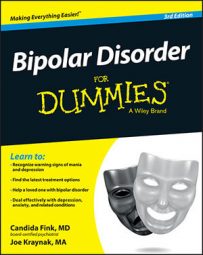Studies have shown lower rates of depression in countries where people eat a lot of seafood. Over the last decade, researchers have tried to understand this connection and have focused on omega-3 fatty acids — nutrients that the body can't manufacture itself and must take in through diet.
Omega-3 fatty acids are necessary for healthy brains and cardiovascular systems, and you find them in high concentrations in many types of seafood. They may work through reducing inflammation in the nervous system and improving brain cells' ability to recover from stress and damage.
Recent reviews of medical research indicate that supplementing standard treatments with omega-3 fatty acids reduces the symptoms of bipolar and unipolar depression. Research hasn't found any particular benefit to omega-3 fatty acids in mania. Additionally, studies suggest that omega-3 supplements may reduce symptoms of anxiety in healthy young adults.
Omega-3s aren't a replacement for your antimanic or antidepressant, especially if you're treating extreme mood episodes, so don't ditch your meds.
You can obtain omega-3 fatty acids from any of the following sources:
Cold-water fish, including salmon, mackerel, herring, tuna, anchovies, and sardines
Wild animals (including deer, buffalo, and free-range chickens)
Omega-3 enhanced eggs
Dark-green leafy vegetables (such as spinach, arugula, and purslane)
Flaxseed oil
Walnuts
Omega-3 supplements
Unless you literally chew the fat with Eskimos, you may have a hard time getting enough omega-3s in your diet to produce the desired effects, so you probably need to take a supplement. Over-the-counter (OTC) fish oil supplements contain two types of omega-3 fatty acids:
Eicosapentaenoic acid (EPA): EPA is generally thought to play more of a role in the antidepressant effect than the other omega-3 (DHA). To get the full antidepressant benefits, most doctors recommend that you get 1 to 2 grams daily of EPA.
Docosahexaenoic acid (DHA): DHA may play a lesser role in depression than EPA, but it does affect overall brain health. Evidence suggests that DHA has protective properties in relation to Alzheimer's.
Unfortunately, the U.S. Food and Drug Administration (FDA) doesn't control what goes into omega-3 supplements, so review dosage recommendations with your psychiatrist or primary-care doctor, ask for product recommendations, and check the label to make sure the supplement is consistent with what your doctor recommends in terms of concentration and dosages of EPA and DHA. Look for a product that has a high purity rating — with the fewest possible contaminants. You may need to try a few different brands to find one with the least fishy aftertaste.
Taking high doses of omega-3 may be associated with increased bleeding, so consult your doctor before ingesting large amounts of omega-3.

